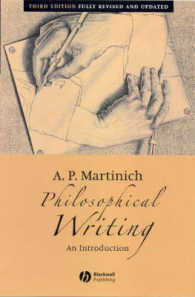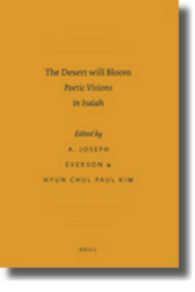- ホーム
- > 洋書
- > 英文書
- > Philosophy
Full Description
Questions as personal as those about suffering require a very personal response. However, the most popular responses to 'the problem of evil' revolve around abstract discussions of greater goods, maximization of value, and best possible worlds, depicting God as at best an impartial bureaucrat and at worst a utility fanatic, rather than as a loving parent concerned first and foremost for his children. Vince R. Vitale develops Non-Identity Theodicy as an original response to the problem of evil. He begins by recognizing that horrendous evils pose distinctive challenges for belief in God. The book constructs an ethical framework for theodicy by sketching four cases of human action where horrendous evils are either caused, permitted, or risked, either for pure benefit or for harm avoidance. This framework is then brought to bear on the project of theodicy. The initial conclusions drawn impugn the dominant structural approach of depicting God as causing or permitting horrors in individual lives for the sake of some merely pure benefit. This approach is insensitive to relevant asymmetries in the justificatory demands made by horrendous and non-horrendous evil and in the justificatory work done by averting harm and bestowing pure benefit. Vitale then critiques theodicies that depict God as permitting or risking horrors in order to avert greater harm. The second half of this book develops a theodicy that falls outside of the proposed taxonomy. Non-Identity Theodicy suggests that God allows evil because it is a necessary condition of creating individual people whom he desires to love. This approach to theodicy is unique because the justifying good recommended is neither harm-aversion nor pure benefit. It is not a good that betters the lives of individual human persons—for they would not exist otherwise, but it is the individual human persons themselves.
Contents
Part I: A Framework for Theodicy
1: Introduction: The Problem of Horrendous Evils
2: The Ethics of Horror Inducement
3: Applying the Analogies: Causing for Pure Benefits
4: Applying the Analogies: Permission and Risk, Benefit Production, and Harm Avoidance
5: High Fall Theodicy
Part II: Beyond the Framework
6: Non-Identity Theodicy
7: The Good of Life: How Much Moral Difference Does Non-Identity Make?
8: Conclusion: Distinctive Features of Non-Identity Theodicy
Bibliography








